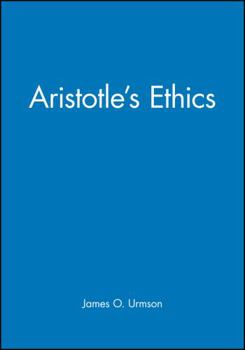Aristotle's Ethics
Select Format
Select Condition 
Book Overview
Aristotle's ethical writings are among the world's greatest, but are easily misunderstood by the inexperienced. Professor Urmson, after 50 years of study, provides a clear account of the main... This description may be from another edition of this product.
Format:Paperback
Language:English
ISBN:0631159460
ISBN13:9780631159469
Release Date:January 1991
Publisher:Wiley-Blackwell
Length:140 Pages
Weight:0.40 lbs.
Dimensions:0.4" x 5.3" x 8.4"
Customer Reviews
3 ratings
We Reach Our Complete Perfection Through Habit
Published by Thriftbooks.com User , 15 years ago
I read this book for a graduate seminar on Aristotle. I think Aristotle's ethics is his most seminal work in philosophy. In the early 1960's virtue ethics came to fore. It is a retrieval of Aristotle. It has very close parallels to the ancient Chinese philosophy of Confucius and the modern philosophy espoused in the 1970's called Communitarianism. For Aristotle Nicomachean Ethics, (EN) is about human life in an embodied state. Area of inquirery for EN is "good" this is his phenomenology. What does "good" mean? He suggests good means "a desired end." Something desirable. Means towards these ends. Such as money is good, so one can buy food to eat because "eating is good." In moral philosophy distinction between "intrinsic good" vs. "instrumental good." Instrumental good towards a desire is "instrumental good" like money. Thus, money is an "instrumental good" for another purpose because it produces something beyond itself. Instrumental good means because it further produces a good, "intrinsic good" is a good for itself, "for the sake of" an object like money. "Intrinsic good" for him is "Eudemonia=happiness." This is what ethics and virtues are for the sake of the organizing principle. Eudemonia=happiness. Today we think of happiness as a feeling. It is not a feeling for Aristotle. Best translation for eudaimonia is "flourishing" or "living well." It is an active term and way of living for him thus, "excellence." Ultimate "intrinsic good" of "for the sake of." Eudaimonia is the last word for Aristotle. Can also mean fulfillment. Idea of nature was thought to be fixed in Greece convention is a variation. What he means is ethics is loose like "wealth is good but some people are ruined by wealth." EN isn't formula but a rough outline. Ethics is not precise; the nature of subject won't allow it. When you become a "good person" you don't think it out, you just do it out of habit! You can have ethics without religion for Aristotle. Nothing in his EN is about the afterlife. He doesn't believe in the universal good for all people at all times like Plato and Socrates. The way he thought about character of agent, "thinking about the good." In addition, Aristotle talked about character traits. Good qualities of a person who would act well. Difference between benevolent acts and a benevolent person. If you have good character, you don't need to follow rules. Aretç=virtue, in Greek not religious connotation but anything across the board meaning "excellence" high level of functioning, a peak. Like a musical virtuoso. Ethical virtue is ethical excellence, which is the "good like." In Plato, ethics has to do with quality of soul defining what to do instead of body like desires and reason. For Aristotle these are not two separate entities. To be good is how we live with other people, not just focus on one individual. Virtue can't be a separate or individual trait. Socrates said same the thing. Important concept for
Keen Analysis
Published by Thriftbooks.com User , 21 years ago
This book is a keen analysis of Aristotle's Nichomachean Ethics. Although only 130 pages, Urmson explains Aristotle's ideas very precisely. Urmson's diction and economy of words are evidence of his great learning on the subject. He thinks and write like a master. My only complaint is that the two page index is inadequate. But in a short book, that is not fatal.
Fifty years experience shines through on every page.
Published by Thriftbooks.com User , 25 years ago
Urmson offers a clear, concise, and even handling of all the major issues Nicomachean Ethics contains. The thematic structure of the book is outstanding. Urmson is like a grandfather who understands the "modern" difficulties of the day but is peacefully removed from their "pull."




